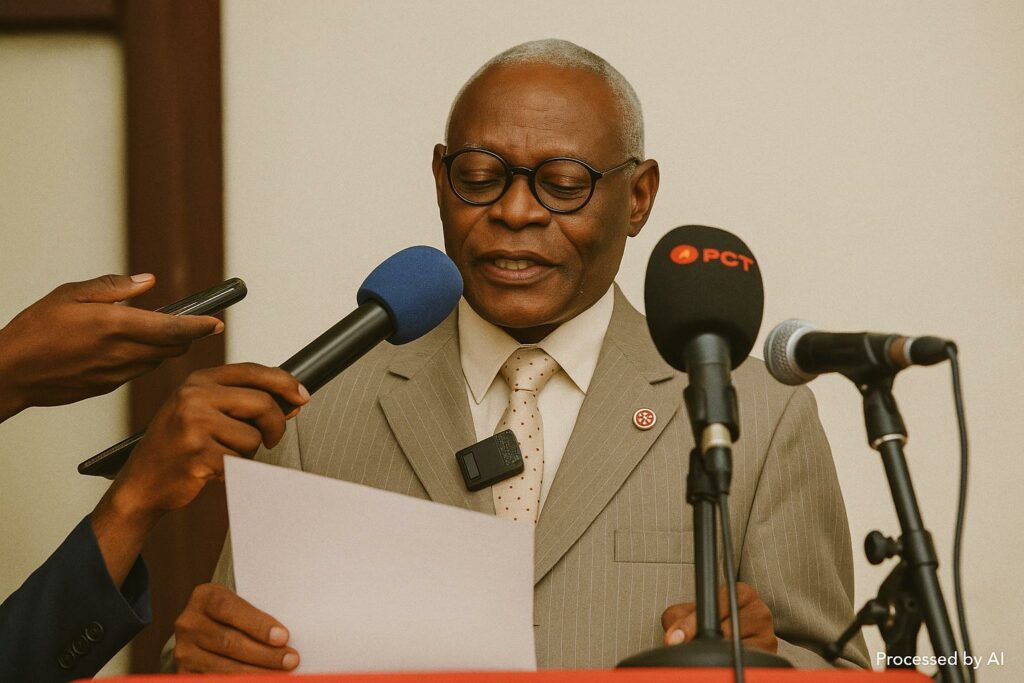Ceremonial Affirmation of Party Unity in Kinkala
On 21 July the central plaza bearing the name of nationalist figure André Grenard Matsoua in Kinkala became a political amphitheatre where cadres, parliamentarians and rank-and-file members of the Congolese Labour Party gathered beneath the sweltering dry-season sky. The secretary-general of the party, Pierre Moussa, presided over a meticulously choreographed ceremony that invested Jean-Pierre Heyko Lékoba with the function of political commissioner for the Pool. Speeches that blended revolutionary rhetoric with managerial vocabulary echoed through loudspeakers, insisting that unity, discipline and solidarity are more than slogans—they are, in Mr Moussa’s words, “the cement of our national project”.
Strategic Timing before the Sixth Ordinary Congress
The installation unfolds scarcely eight months before the PCT’s sixth ordinary congress and fewer than three years before the March 2026 presidential election, a chronology that explains the sense of urgency visible in Kinkala. Party federations across the country have started fine-tuning their internal architecture, seeking to transpose the well-oiled machinery long observed in Brazzaville to every arrondissement and district. The Pool federation’s president, Marie-Jeanne Kouloumbou, highlighted this temporal convergence by calling for a first-round victory for the majority’s candidate, a formulation widely understood as a commitment to maintain President Denis Sassou Nguesso’s longstanding policy line. Observers in Brazzaville perceive the move as part of a broader strategy to demonstrate organisational readiness to regional partners and investors wary of electoral turbulence.
The Pool Department’s Post-Conflict Landscape
The Pool has often occupied a unique space in Congo-Brazzaville’s political imagination: a railway artery to the coast, a breadbasket for urban centres and, at times, an arena of rebellion. The 1998-2003 hostilities and the more recent low-intensity clashes of 2016-2017 left physical scars still visible along the RN1 corridor. Yet the government’s Programme de développement local et d’appui à la décentralisation, supported by multilateral lenders, has rehabilitated schools, health posts and segments of the Congo–Ocean Railway, gradually transforming the security narrative into one of recovery. The presence of senior PCT figures in Kinkala therefore resonated far beyond partisan symbolism; it signalled that the ruling coalition considers the department integral to its agenda of national pacification and inclusive growth.
Jean-Pierre Heyko Lékoba’s Technocratic Profile
A seasoned administrator who has served as prefect in both the Cuvette and Niari as well as a deputy for Étoumbi, Mr Lékoba arrives in Kinkala with a résumé that blends local familiarity with national exposure. During his tenure in the Niari he piloted public-private partnerships aimed at revitalising agro-industrial complexes surrounding Dolisie, earning the reputation of a consensus builder attentive to fiscal prudence. Party insiders underline that such credentials are indispensable in the Pool, where infrastructural deficits intersect with expectations of accelerated development. In a brief address he pledged to translate the guidelines of the national secretariat into operational plans, submitting periodic reports “so that no warning signal goes unnoticed”. Colleagues close to the new commissioner describe him as “meticulous, patient and unwaveringly loyal”, traits valued in a political environment that prizes organisational continuity.
Internal Mobilisation and External Perceptions
Pierre Moussa used the platform to encourage the proliferation of grassroots nuclei—cells, sections and committees—that historically constitute the PCT’s capillary network. His appeal responds to demographic dynamics; the Pool’s youthful population, increasingly connected through mobile broadband expansion, demands more interactive channels of political socialisation. Diplomats stationed in Brazzaville note that such community-level engagement can mitigate misinformation, a concern repeatedly raised by development partners. Regional observers also argue that a visible PCT presence in the Pool reassures investors involved in highway modernisation and agri-logistics projects that the security dividend of the 2017 ceasefire is durable.
Looking toward the 2026 Presidential Poll
As the Congolese economy adapts to fluctuating hydrocarbon receipts and seeks to diversify into renewable energy and agribusiness, political stability remains the prime currency for foreign direct investment. The Kinkala ceremony therefore operated on two wp-signup.phps: an internal rallying call and an external signal of continuity within constitutional bounds. Analysts observe that the sixth congress will likely reaffirm programmatic priorities aligned with the National Development Plan 2022-2026, notably the acceleration of industrial corridors linking the deep-water port of Pointe-Noire to hinterland mining clusters. For the Pool department, such macroeconomic ambitions translate into tangible prospects—enhanced railway frequency, feeder roads to cassava-producing zones and expanded access to vocational training. By endorsing Mr Lékoba, the PCT leadership underscores its intent to anchor these initiatives in a disciplined political framework, fostering conditions under which the 2026 electoral exercise can unfold in an atmosphere of cohesion rather than contestation.

